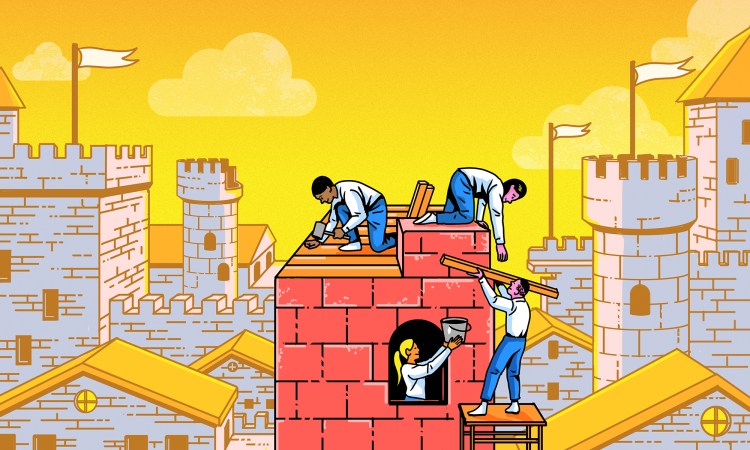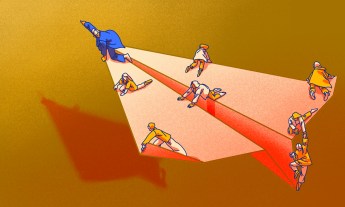
This post is part of TED’s “How to Be a Better Human” series, each of which contains a piece of helpful advice from people in the TED community; browse through all the posts here.
We’re currently living in an era of teamwork.
Today, we take for granted the fact that we can be on the same team as somebody who lives on the other side of the country — or the world — and that’s largely because of technology. As a result of technology, people are developing in-organization solutions that are amazing and complex and that are solving problems in business, medicine and communication, in every kind of field. Those complex solutions demand that people collaborate and work together as teams.
But even though teamwork is everywhere, we continue to train people — whether in education or in the workforce — for primarily individual and technical skills. As someone who’s worked with teams for the past 25 years in the corporate world and written two books about teamwork, I think that needs to change. And that’s why I’m going to share with you the three simple virtues that make for a good team player.
The first and by far the most important is humility. If you want to be an ideal team player and if you want to be successful in life, you really need to be humble. Most of us know what humility is — it means not being arrogant or self-centered but putting others ahead of ourselves. It’s such an attractive and powerful thing.
When somebody lacks confidence and makes themselves small, that’s not humility. To deny our talents is actually a violation of humility, just like it is to exaggerate them. The writer C.S. Lewis said it best when he wrote, “Humility isn’t thinking less of ourselves, it’s thinking about ourselves less.” (Editor’s note: That quote has long been misattributed to Lewis.)
The second is equally simple: You have to be hungry. This simply means having a strong work ethic. People who have an innate hunger about getting work done are typically much more successful on teams and in life. This quality is the one that you probably have to develop earliest in life; when I work with people later in life who never developed it, it can be harder for them to build it. Being hungry is not about workaholism, though. Workaholics are people who get their entire identity from their work. People who are hungry just want to go above and beyond what’s expected; they have a high standard for what they do, and they never do just the minimum.
The third attribute is what I call being smart. But it’s not about intellectual smarts; this is about emotional intelligence and having common sense around how we understand people and how we use our words and actions to bring out the best in others. This is so important in the world, and being smart is one of those things that people can work on and get better at.
You need to have all three qualities to be a great team player. So it’s really important that you learn how to identify in yourself and in others when one of them is lacking. I’ve come up with some labels that you can use to refer to people (including yourself) who are missing one of these traits.
A person may be humble and hungry but they lack smarts — I call them the accidental mess maker. As a manager, I have a lot of time for accidental mess makers. They’re good people, they have really good intentions, but they create problems that they’re not aware of. They’re like a puppy; they knock things over a lot but they mean well. The problem with this type is you have to clean up after them and over time, you can get tired of having to say things like, “He’s a really good guy; he didn’t mean it that way.”
Then there’s someone who’s humble and smart but they lack hunger — I call them the lovable slacker. The problem is while they’re lovable and really fun to be around, they do just the bare minimum. They don’t go above and beyond. You have to constantly remind them to do more, and you have to pick up their slack in an organization.
The most difficult type is the team member who is hungry and smart but they’re not humble — I call them the skillful politician. They know how to portray themselves as being humble, which is a very dangerous thing. They’re able to interview well, and they say the right things at meetings. The problem is, deep down inside them, work is about them, and not about others. By the time managers figure it out, there’s usually a trail of dead bodies hidden in closets around the organization.
So, what do you do with this information?
Don’t misuse these labels. Don’t say to your boss or colleague, “Hey, I think that you’re an accidental mess maker.”
Next, apply these categories to yourself and the people around you. Sit down with your work team, your family, or the soccer team you coach. Explain the qualities, and have everybody rank themselves in those three areas — which one they’re best at, second best and third. Even if they’re good at all of them, they’re still going to be better in some and weaker in another.
Then, go around the group and ask people to explain their third and why it’s theirs. Talk together about how they can strengthen this trait. Give each other advice; turn your colleagues, your team members and your family members into each other’s coaches.
For the person who needs help being humble, you might say something like, “Maybe you shouldn’t talk about yourself so much and instead, ask questions about others and take an interest in their lives.” For the person who needs to be hungry, suggest that when they’re about to sign out for the day, they should check in and see if there’s work that still needs to be done. And for the person who needs to be emotionally smarter, ask them to double-check at the end of meetings whether they’ve treated everyone with kindness and respect.
It’s time that we changed the way we think about success as a society and how we prepare people for success in life. By developing these three qualities in ourselves, we could start to change ourselves and improve our organizations, our schools, our families — and our world.
This piece was adapted from a TEDxUniversityofNevada Talk. Watch it here:













